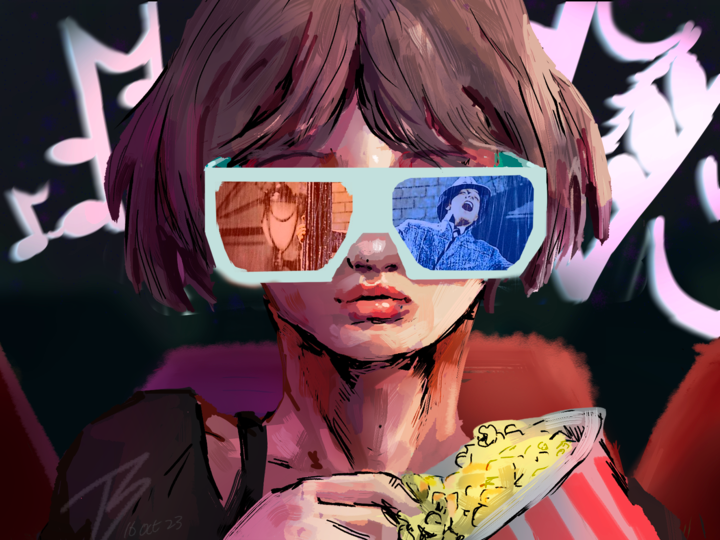I’ve never experienced a performance as powerful and audience-rousing as Blitz Bazawule’s “The Color Purple” (2023).
The musical numbers are visually stunning and the cast is stacked not just with big names, but also amazing singers. Taraji P. Henson’s show-stopping portrayal of Shug Avery and Danielle Brooks’s scene-stealing vocal performance as Sofia certainly make “The Color Purple” (2023) worth a watch. Yet, it’s Fantasia Barrino’s performance as Celie that made me wish the film never ended.
Alice Walker’s 1982 novel by the same name was initially adapted to film by Steven Spielberg in 1985, and later to Broadway by playwright Marsha Norman. The 2023 musical film remake is something of a fusion of its predecessors; the movie was even produced by Oprah Winfrey, who portrayed Sofia in the 1985 adaptation. To my delight, this particular medium successfully elevates and solidifies the source material.
The film’s musical numbers portray Celie’s character growth, implicitly conveying her evolution. The first song is “Huckleberry Pie,” a playful patty-cake-like song vocalized by Halle Bailey and Phylicia Pearl Mpasi (playing younger versions of Nettie and Celie, respectively) that shows their sisterly connection.
It features a banjo instrumental, with Nettie leading the vocals for the song and Celie following along. This is a wonderful song that establishes how Celie follows behind Nettie, dwelling in her sister’s shadow. The duo’s other track “Keep It Movin” similarly presents this plot detail: Nettie is again the main voice while Celie trails behind in both vocals and dance.
These musical numbers also work together to demonstrate how the sisters are perceived by other characters. In the film, Nettie is said to be prettier, and eventually goes to school to become a teacher; meanwhile, Celie is constantly degraded and told she will never sum up to anything.
Nettie is the only one to believe in her sister’s future — a fact that is also conveyed masterfully through song. After Celie is married off to Mister (played by Colman Domingo) and experiences years of domestic abuse, she loses both her sense of self and her love for singing.
The tide turns when Celie meets Shug Avery, a talented musical artist who is popular in town. For the first time in years, Celie feels seen. So it’s no wonder that Celie’s first solo performance is because of Shug Avery and is titled “Dear God – Shug.”
The audience journeys into Celie’s mind to discover her curious desire and admiration for Shug Avery. Celie expresses herself without worrying about the repercussions, delivering a sincere aspiration to understand her feelings for Shug and how she can get to know the musician.
During this scene, Celie is bathing Shug Avery when the former begins to feel a sense of attraction to Shug. The song is deeply inquisitive and features light jazz tones with a soft-toned performance from Fantasia Barrino. The set even changes to feature Celie singing atop a gramophone, lightly tiptoeing around Shug Avery so as to not disturb her bath. This performance shows Celie emerging from the shy and unassertive veil she previously leaned on to navigate a world full of misogyny.
Celie’s final transformation occurs in “I’m Here,” when she truly becomes self-confident. It was like nothing I’ve ever seen on the silver screen. Fantasia Barrino delivers a celestial performance.
Celie begins the song as she was portrayed in the beginning of the film — hesitantly, as if afraid to announce to the world her love for herself. A quiet piano and orchestral symphony support her throughout the piece. But to mimic the transition in Celie’s confidence to step into the spotlight, the orchestra quiets down to highlight Celie’s voice before climaxing to the grand conclusion when Celie declares, “I’m here.”
This number is magnificent and shows how the once-shy and subdued Celie has become a powerful woman in charge of her own story. Throughout the film, Celie admires all the women in her life for different reasons — Nettie’s education, Shug Avery’s attractive energy and Sofia’s self-determination and willingness to fight back. However, what is truly divine about this moment is that Celie realizes she has become the very figure she admired — an independent woman who will fight back, and most importantly, who truly loves herself.
The lyric “I’m beautiful / Yes, I’m beautiful / And I’m here” will never leave my mind. For a woman who is told that she is nothing to slowly realize that she is actually worth everything was the single most powerful performance I saw in 2023. Fantasia Barrino’s voice and acting gave justice to the complexity in Celie’s character.
There are flaws within this film stemming from storylines being sequestered and cut for time, but I am ultimately glad that the release of this story in 2023 brought it closer to younger audiences. There are still rightful critiques regarding the tragedy that is shown on-screen and validity in the need to step away from Black trauma media. It is important to understand how films like these can harm marginalized communities while catering a palatable story to others.
In a recent interview, Oprah Winfrey said she chose to produce the film because “we had reached a point in our culture once again where women’s voices needed to be heard.” I believe that the film did just that, giving these three women — Fantasia Barrino, Taraji P. Henson and Danielle Brooks — a platform to shine.
Title card for “The Color Purple” (2023), distributed by Warner Bros. (Photo: ANTHONY MARTINEZ ROSALES/The Stanford Daily)
Editor’s Note: This article is a review and includes subjective opinions, thoughts and critiques.
